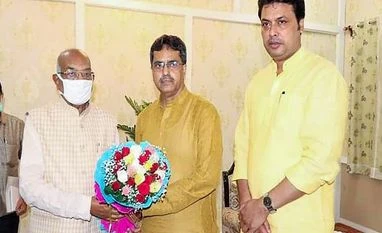It is not often that a state has two chief ministers of the same name. Under Manik Sarkar, the Left Front in Tripura ruled for 25 years with minimal challenges: Until it was conclusively and thoroughly defeated by the Bharatiya Janata Party (BJP) in 2018. It took more than three years for Tripura to get another Manik in the saddle. A dentist, 69-year-old Manik Saha replaced Biplab Deb as chief minister in a BJP-led coalition government (33 MLAs), in which the Indigenous Peoples’ Front of Tripura (IPFT) has seven MLAs (it had eight in 2018 but a split reduced its numbers) in the 60-member House.
Unlike Gujarat or Karnataka, where the BJP displayed confidence and pizzazz by replacing chief ministers when the states are due to go to the polls in about a year, in Tripura, Manik Saha’s appointment ahead of the Assembly elections, due 2023, has roiled the political waters violently. Local media reported how BJP MLA Parimal Debbarma criticised the party leadership over its choice and questioned why there was no consultation on the matter. “He was made state party president unilaterally and we accepted and then he was made Rajya Sabha MP and we accepted that also; but how could he be imposed on us as chief minister without taking our opinion,” said Debbarma. State Minister Ramprasad Paul burst into tears. “I will die, I will not work for such a party,” he is shown as saying in a video circulated by members of his own party, as scuffles broke out and Paul attempted to throw a chair at the hapless BJP observers sent from Delhi to oversee the change in leadership.
“I have no idea why this change was made — maybe the central leaders considered it necessary. We have done our best for the people of Tripura and I hope we will continue to do it,” Jishnu Dev Varma, who was deputy chief minister, told local reporters.
Manik Saha has his work cut out for him: Once a colleague, now primary rival, Deb is heading the party; the alliance partner IPFT is supporting him for now, but no one knows how long this bonhomie will last; and the Trinamool Congress is picking up the residual pieces of both the Congress and the CPI(M).
Interestingly, in Tripura, the challenge for the chief minister is less from the alliance partners and more from his own party. Discontented elements now have an incentive to leave the BJP — provided there is an alternative.
The first test will likely come in July. The 8-Bordowali Assembly constituency, the home turf of former BJP MLA and Congress leader Asish Saha, is the constituency the BJP has chosen for Manik Saha to contest the Assembly poll because he is a Rajya Sabha MP, not an Assembly member. The vacancy has arisen because Asish Saha, who was elected in the 2018 Assembly election on the BJP ticket, quit the party after an abortive revolt against Biplab Deb and joined the Congress. Given the dire state of the Congress (in the 2018 elections, the party’s vote share went down from 35 per cent to 2 per cent), unless there is a semblance of unity in the opposition, the BJP will gain.
But there are governance challenges as well, some of them immediate. Rain has washed off huge tracts of roads and railway lines, and, as a result, Tripura, Mizoram, and south Assam are facing a livelihood challenge: There is hardly any petroleum, food security is seriously threatened, and medical facilities are reporting shortages. On May 16, the Indian Air Force (IAF) reported it had airlifted 1,500 passengers marooned because of rain.
In the longer term, former bureaucrat Gautam Sen says part of the answer for the development of Tripura lies in Bangladesh: “Tripura is an energy storehouse of the Northeast by virtue of its substantial petroleum and natural gas reserves. A common market approach, based on an integrated power grid system, is an inescapable need. Already electricity transmission has commenced from the gas-based power projects of the state to Bangladesh. An institutional arrangement is necessary for joint India-Bangladesh management of a Tripura-based energy network under an agreed equity partnership of assets.”
Trinamool Congress (TMC) General Secretary and MP Abhishek Banerjee is to visit Tripura at the end of this month or in the first week of next month, the Tripura president of the party, Subal Bhowmik, has told reporters. Banerjee is scheduled to visit Guwahati to inaugurate the state party headquarters and he is expected to visit Tripura at the end of his Assam tour. Some political upheavals might follow his visit. Sushmita Dev, formerly of the Congress and now with the TMC, has her sights fixed firmly on Tripura as a possible area of expansion. The expansion model will not be very different from the TMC’s growth in other states: Tap and draw in those in the Congress who cannot go to the BJP.
Prime Minister Narendra Modi, in his speech on the 50th anniversary of Tripura’s statehood in January this year, observed: “For so many decades, the only way Tripura had access to the rest of India was by road. There used to be a shortage of essential goods in the entire Northeast, including Tripura, when the roads would get blocked due to landslides in the monsoon. Today Tripura is getting rail, air, inland waterway along with the roads.” He added this was the result of the “double-engine Sarkar”.
But the monsoons are here. And parts of Tripura are still unreachable. This is Manik Saha’s greatest challenge.
Unlock 30+ premium stories daily hand-picked by our editors, across devices on browser and app.
Pick your 5 favourite companies, get a daily email with all news updates on them.
Full access to our intuitive epaper - clip, save, share articles from any device; newspaper archives from 2006.
Preferential invites to Business Standard events.
Curated newsletters on markets, personal finance, policy & politics, start-ups, technology, and more.
)